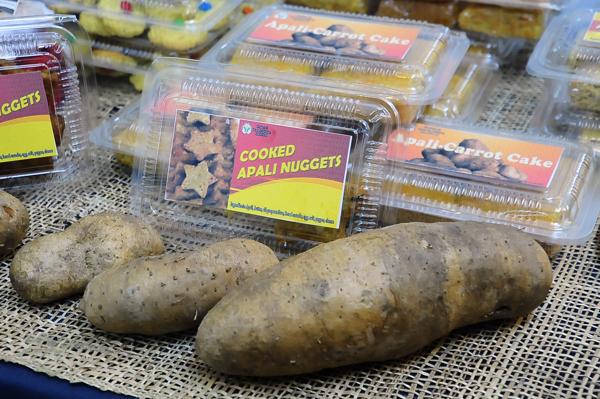Apali nuggets for vegetarians
Who would have thought that an indigenous tuber crop, found in the tropical forest of the Philippines can be turned into nuggets, a healthy alternative for non-pork eaters?

The Apali nuggets have recently gained the public’s attention when it won the “Best Product Award” (third place) during the “First Mindanao Technology Commercialization Forum” held in Davao City on November 24, 2018. The event showcased different innovative products generated from supported research of the Bureau of Agricultural Research (BAR) in six regions of Mindanao (9, 10, 11, 12, Caraga, and ARMM).
Apali (Dioscorea esculenta Lour. Burkill) or commonly known as the “lesser yam” is a tuber crop that is rich in carbohydrates and is a good addition to the usual rice and corn.
According to Jorgea C. Galindo of the Research Division of the Department of Agriculture-Regional Field Office (DA-RFO) 11, Apali is highly-nutritious and has medicinal properties that even the early Filipinos and their ancestors have been consuming this crop. But due to the introduction of other crops in the country, Apali has been set aside and has been taken for granted and therefore, has not been cultivated in many areas of the country.
Apali is mostly found in marginal, mostly secluded areas. It is a climate-resilient crop and can sustain long drought. It is also resistant to pest and diseases and easy to manage.
With the aim of promoting and increasing the cultivation of Apali, the Research Division of DA-RFO 11 has been studying this crop, specifically its production so that more farmers will be encouraged to grow this indigenous crop.
“We have collected and studied different varieties of Apali. This research initiative is also in harmony with the government’s effort to promote the use of underutilized crops such as the Apali and potentially address food security,” explained Galindo.
DA-RFO 11 has developed appropriate culture and management for Apali including soil and planting requirements, harvesting, and postharvest. In their study, it was found out that a hectare of Apali can yield from 25 to 70 tons following the production management that they have developed.
“Apali can be grown even without fertilization granting that the area is already rich in organic matter. Mostly, this crop loves sandy loam and clay loam, with soil that is high in organic matter. It thrives in open or partial shaded area being trellised. It can be intercropped with peanuts or mungbean,” said Galindo.
DA-RFO 11 has also developed various products from Apali. Due to its potato-like characteristics, Apali can be processed into cue, boiled, sweetened, jams, ice cream, candies, or as vegetable mixed or stewed with meat.
“We started Apali fries and then we also tried Apali chips. When we acquired the equipment, after peeling and slicing as chips, we dehydrated, milled and turned it into flour. The texture of Apali flour is similar to all-purpose flour. Trial studies have been done using the basic food recipes like munchkin, cookies, choco chip cookies, brownies, oatmeal cookies, pineapple carrot cake, and scotch bar, among others.
Most of these products were displayed during the 2017 Agriculture and Fisheries Technology Commercialization Forum and Product Exhibition (NTF) held at BAR in Diliman, Quezon City. In fact, the “Apali flour” won the “Best Product” explained Galindo.
The latest product from Apali is the nugget. “It comes from raw tuber of Apali. We extracted the starch. The leftover, called “sapal” is then processed into nuggets. “Sayang naman kase dapat makain din ito ng tao,” said Galindo.
When asked why Apali nuggets, Galindo was quick to explain that, “nuggets are among the favorite finger foods among children and adults. It can also be part of a rice meal.” Feedback from those who have tasted the Apali nuggets cited that, they were delicious, “parang ulam daw” Galindo recalled.
Apali nuggets can be part of a vegan meal or a healthy option for those who are avoiding pork but still want to enjoy a good o’l meaty nugget. ###
———–
For more information:
Jorgea C. Galindo
Project Leader
Research Division
DA-RFO 11
Manambulan, Tugbok, Davao City
mobile: 0927-3215108
email: galindojorgea2@gmail.com
by Rita T. dela Cruz, bar.gov.ph



Appreciation for really being thoughtful and also for deciding on certain marvelous guides most of the people really want to be aware of.
I simply wanted to write down a quick word to say thanks to you for those wonderful tips and hints you are showing on this site.
To exit without the answers to the difficulties you have sorted out through this guide is a critical case, as well as the kind which could have badly affected my entire career if I discovered your website.